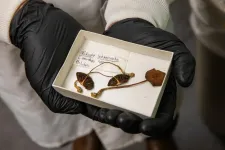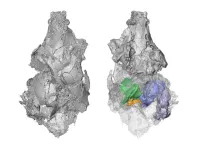(Press-News.org) Novel findings from a preclinical head-to-head comparison show that administering a COVID-19 vaccine as a nasal spray rather than a subcutaneous injection enhances the body’s long-term immune memory, thereby increasing the vaccine’s overall effectiveness.
This research could pave the way for a COVID-19 vaccination strategy that depends on fewer boosters to achieve the same level of protection against SARS-CoV-2 viruses.
SINGAPORE, 10 January 2024 – A team of scientists, led by Duke-NUS Medical School, has discovered a potential intranasal vaccine candidate that provides improved, longer-lasting immunity against SARS-CoV-2 viruses compared to when given as an injection. By triggering an immune response directly at the point of entry, the intranasal vaccine candidate enhanced long-term immune memory of the virus, which could translate to a reduced need for booster shots.
There is growing evidence that intranasal vaccines provide greater protection at mucosal surfaces, making this a vaccination route that could reduce break-through infections and subsequent transmission of the virus.
To delve into this, the research team, which includes collaborators from Duke-NUS’ parent universities—Duke University and the National University of Singapore—among others, compared the immune responses from nasal and subcutaneous administration of the vaccine, as well as immunity from the vaccine with and without the use of adjuvants—substances added to vaccines to enhance the body's immune response.
Published in eBioMedicine, the findings showed nasal administration of the vaccine candidate boosted mucosal antibody response, as expected. Additionally, and more importantly, it enhanced longer-lasting mucosal and systemic immune protection through preferential induction of airway-resident T cells and central memory T cells.
“Our data show that, compared to subcutaneous vaccination, the intranasal route improved the response of certain immune cells, known as T cells, which reduced disease severity,” explained Associate Professor Ashley St John, from Duke-NUS’ Emerging Infectious Diseases Programme, who is the lead author of the study. “Not only that, but it also resulted in a greater number of T central memory cells compared to subcutaneous vaccination, which could lead to longer-lasting protection.”
T central memory cells play a vital role in safeguarding the body upon re-exposure to a virus. They enhance the immune system’s memory, inducing long-lasting protective immune responses. This ability to retain this long-term memory of the virus suggests less need for a pathogen challenge to achieve the same level of protection against the virus, potentially translating into fewer boosters.
The research team also found that the use of adjuvants in the vaccine to promote immune response influenced the characteristics of T cells, as well as their activation and production of cytokines—tiny proteins that regulate cell communication and control inflammation—with different adjuvants leading to different T-cell responses.
Another notable finding from the study was that a type of antibody, called IgG, that circulates widely in the bloodstream is more effective at neutralising variants of the virus, including newly emergent ones, when induced through the nasal vaccine route. These discoveries provide important scientific evidence that improved immunity responses from both T cells and IgG antibodies contribute to greater and long-lasting protection of intranasal vaccines from COVID-19.
“While the acute phase of the pandemic may be behind us, the rise of new variants, including JN.1, which has triggered an increase in hospital admissions locally, demonstrates that we have room in our arsenal of vaccines and treatments for even better tools. This study shows that mucosal vaccination holds promise for improving COVID-19 vaccine efficacy with potentially fewer boosters needed,” said Professor Patrick Tan, Senior Vice-Dean for Research at Duke-NUS.
A patent has been filed on the discovery, which covers the invention of the vaccine composition formulated for mucosal delivery, paving the way for an industry partnership to potentially develop mucosal vaccines against COVID-19 and other pathogens that also target mucosal surfaces.
END
Duke-NUS scientists discover potential nasal COVID-19 vaccine candidate that offers better and longer protection
2024-01-10
ELSE PRESS RELEASES FROM THIS DATE:
Traumatic stress associated with smaller brain region
2024-01-10
DURHAM, N.C. – Adults with posttraumatic stress disorder (PTSD) have smaller cerebellums, according to new research from a Duke-led brain imaging study.
The cerebellum, a part of the brain well known for helping to coordinate movement and balance, can influence emotion and memory, which are impacted by PTSD. What isn’t known yet is whether a smaller cerebellum predisposes a person to PTSD or PTSD shrinks the brain region.
“The differences were largely within the posterior lobe, where a lot of the more cognitive functions attributed to the cerebellum seem to localize, as well as the vermis, which is linked to a lot of emotional processing ...
Largest diversity study of ‘magic mushrooms’ investigates the evolution of psychoactive psilocybin production
2024-01-10
Psilocybe fungi, known colloquially as “magic mushrooms,” have held deep significance in Indigenous cultures of Mesoamerica for centuries. They captured the wider world’s attention as a psychedelic staple in the 60s and 70s. Now, these infamous organisms are at the forefront of a mental health revolution. Psilocybin and psilocin, the psychoactive compounds found in nearly all species of Psilocybe, have shown promise as a treatment for conditions including PTSD, depression, and for easing end-of-life care.
To ...
Sex-specific panel of 10 proteins can pick up 18 different early stage cancers
2024-01-10
A sex-specific panel of 10 proteins can pick up 18 different early stage cancers, representing all the major organs of the human body, finds a proof of concept study published in the open access journal BMJ Oncology.
The findings could kick-start a new generation of screening tests for early detection of the disease, say the researchers, particularly as there are many sex specific differences in cancer—including age at occurrence, cancer types, and genetic alterations—points out a linked editorial.
Cancer accounts for 1 in every 6 deaths around the globe, with nearly 60% of these deaths ...
Predominantly plant-based or vegetarian diet linked to 39% lower odds of COVID-19
2024-01-10
A predominantly plant-based or vegetarian diet is linked to 39% lower odds of COVID-19 infection, finds research published in the open access journal BMJ Nutrition Prevention & Health.
The findings prompt the researchers to suggest that a diet high in vegetables, legumes, and nuts, and low in dairy products and meat may help to ward off the infection.
Several studies have suggested that diet may have an important role in the evolution of COVID-19 infection, as well as in the factors that heighten the risk of its associated ...
Early menopause and HRT among hormonal factors linked to heightened rheumatoid arthritis risk
2024-01-10
Early menopause—before the age of 45—taking hormone replacement therapy (HRT), and having 4 or more children are among several hormonal and reproductive factors linked to a heightened risk of rheumatoid arthritis in women, finds a large long term study published in the open access journal RMD Open.
Women are more susceptible to this autoimmune disease than men, note the researchers. They are 4–5 times as likely as men to develop rheumatoid arthritis under the age of 50, and twice as likely to do so between the ages of 60 and 70. And the disease seems to take a greater physical toll on women than it does on men.
While ...
City of Hope Children’s Cancer Center, Children’s Oncology Group conduct largest clinical trial seeking to prevent heart failure among childhood cancer survivors
2024-01-10
LOS ANGELES — Physicians at City of Hope, one of the largest cancer research and treatment organizations in the United States, in cooperation with the Children’s Oncology Group (COG), have conducted the largest clinical trial to date seeking to reduce the risk of people who have survived childhood cancer from developing heart failure. The findings published in The Lancet Oncology show that the blood vessel relaxing medication carvedilol is safe for childhood cancer survivors to take and may improve important markers of heart injury sustained as a result of chemotherapy exposure.
One devastating ...
New research sheds light on an old fossil solving an evolutionary mystery
2024-01-10
New York, January 9, 2024 — A research paper published in Royal Society’s Biology Letters on January 10 has revealed that picrodontids —an extinct family of placental mammals that lived several million years after the extinction of the dinosaurs—are not primates as previously believed.
The paper—co-authored by Jordan Crowell, an Anthropology Ph.D. candidate at the CUNY Graduate Center; Stephen Chester, an Associate Professor of Anthropology at Brooklyn College and the Graduate Center; ...
No laughing matter: Leadership critical to help address NHS retention crisis
2024-01-10
Frontline healthcare workers in busy hospitals feel that they are “just rearranging the deckchairs on the Titanic” according to new research into the impact of under-resourced and high-pressure emergency hospital departments in the UK.
A study from the Royal College of Emergency Medicine and University of Bath, led by clinical psychologist Dr Jo Daniels in collaboration with colleagues at UWE Bristol and the University of Bristol, argues that hospitals need better leadership to help change cultures and support people’s basic needs.
In addition to reflections ...
Acidity of Antarctic waters could double by century’s end, threatening biodiversity
2024-01-10
The acidity of Antarctica’s coastal waters could double by the end of the century, threatening whales, penguins and hundreds of other species that inhabit the Southern Ocean, according to new research from the Univeristy of Colorado Boulder.
Scientists projected that by 2100, the upper 650 feet (200 meters) of the ocean—where much marine life resides—could see more than a 100% increase in acidity compared with 1990s levels. The paper, appeared Jan. 4 in the journal Nature Communications.
“The findings are critical for our understanding ...
Injectable hydrogel electrodes open door to a novel painless treatment regimen for arrhythmia
2024-01-09
HOUSTON (Jan 9, 2024)— A breakthrough study led by Dr. Mehdi Razavi at The Texas Heart Institute (THI), in collaboration with a biomedical engineering team of The University of Texas at Austin (UT Austin) Cockrell School of Engineering led by Dr. Elizabeth Cosgriff-Hernandez, sets the foundation of a ground-breaking treatment regimen for treating ventricular arrhythmia. Their study published in Nature Communications demonstrates the design and feasibility of a new hydrogel-based pacing modality.
The urgent need for an effective therapeutic ...




